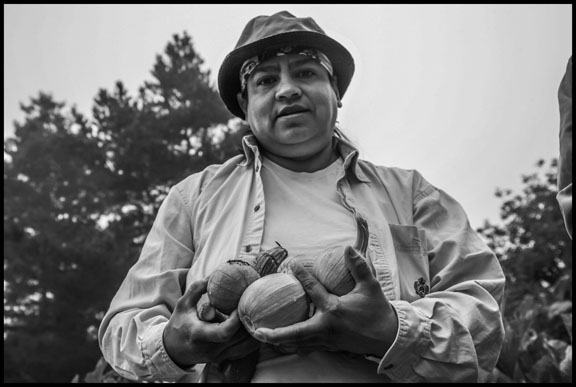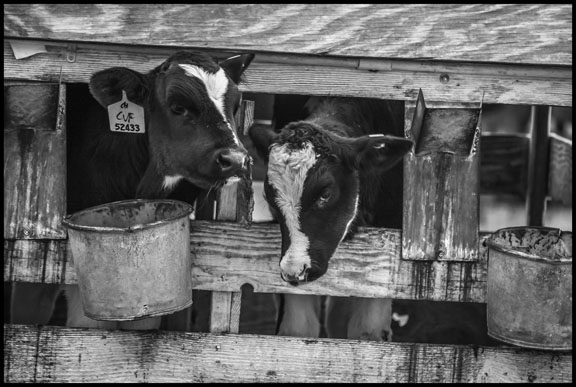US troops need to leave Iraq. They need to do so now.
Saturday, June 13, 2020
Look who's making things up now
US troops need to leave Iraq. They need to do so now.
Women who are unjustly imprisoned in El Salvador must be released in the face of the COVID-19 pandemic
Amidst the imminent spread of the COVID-19 pandemic and the precarious prison infrastructure in El Salvador, La Agrupación Ciudadana por la Despenalización del Aborto, La Colectiva Feminista para el Desarrollo Local , the Centre for Reproductive Rights (CRR), Women's Equality Center (WEC) and the Center for Justice and International Law (CEJIL) call on the State of El Salvador to take urgent measures to reduce overcrowding in detention centers and, in accordance with the principles of non-discrimination, to release women wrongly imprisoned for having suffered obstetric emergencies.
The COVID-19 health crisis has further revealed the seriousness of the structural problems affecting El Salvador, including the severe deficiencies in its penitentiary system. International human rights organizations have already warned that prisons can be a focus of transmission of the virus and that, as such, it is necessary that States, as El Salvador, take the necessary steps to reduce prison overcrowding by releasing people in vulnerable conditions. It is widely known that Salvador’s detention centers do not have adequate sanitary conditions to prevent contagion: there is no access to safe drinking water; facilities do not allow for the implementation of social distancing measures among inmates; there is no access to timely health services; and, as has been known publicly, the treatment of prisoners amounts to cruel and inhumane.
In the context of the pandemic, El Salvador has already received several calls to respect the rights of inmates. The Inter-American Commission on Human Rights (IACHR) asked El Salvador to respect the Principles and Good Practices of the Protection of Persons Deprived of Liberty in the Americas. Specifically, IACHR has asked States to grant early release for people considered to be in risk groups, such as the elderly, pregnant women or women with children in their care. This human rights body has also highlighted that measures aimed at reducing overcrowding in prisons should be applied transparently and without discrimination.
During this health crisis, the UN High Commissioner for Human Rights, Michelle Bachelet, also called for an investigation into all alleged human rights violations in the context of the implementation of the COVID-19 response measures. The High Commissioner was emphatic that States have an obligation to respect the prison population by taking steps to prevent foreseeable threats to public health, and that, in order to do so, States need to adopt measures to reduce overcrowding by releasing, among others, prisoners who are detained with insufficient legal basis.
This is the case for women who are arbitrarily detained in El Salvador. As established by the UN Working Group on Arbitrary Detention last March, in this country, women who have suffered obstetric emergencies are arbitrarily detained. The Working Group found that these women are victims of the current Salvadoran normative framework which is discriminatory because it restricts the human rights and dignity of women by criminalizing the exercise of their reproductive rights and the conducts that are a direct result of the lack of access to health services. In the context of the COVID-19 pandemic, the situation of these women is worsened because they are arbitrarily detained and are exposed, as an additional risk, to the spread of the virus.
Globally, many countries have applied the UN's recommendations of reducing the prison population to mitigate the impacts of the pandemic. In Latin America, several States have aligned themselves in the same regard and have granted freedom or early release to populations in vulnerable contexts with a view of containing COVID-19 transmissions. We highlight the following examples:
- In Chile, women who have served a third of their sentence; women who have 36 months -or less- left on their sentence; and pregnant women and / or mothers with a child under 2 years of age residing in the penitentiary institution, have been released from prison.
- In Colombia, house arrest has been granted to pregnant women or those with children under three years of age, among prison detainees, as well as to people under pre-trail detention measures for wrongful crimes.
- In Mexico, women accused of the alleged crime of abortion have been released, and, by extension, the health personnel who carried out the procedures, without violence and with the consent of that woman, have also benefitted from this measure.
- In Brazil, the review of pre-trial detentions, with a view of releasing pregnant women, infants, mothers or persons responsible for children up to 12 years of age or people with disabilities, as well as older, indigenous, disabled or persons in a vulnerable group has been recommended.
- In Nicaragua, 1700 people who had no criminal record and who were charged with crimes for which some sort of bail was accepted, were released.
It is clear that countries in the region have released a significant number of women, considering conditions, such as, their status as mothers, whether their underage children are in or out of prison; whether they are in pre-trail detention; or whether they have served a considerable portion of the sentence imposed on them. As such, it is worth saying that many of wrongfully imprisoned Salvadorian women find themselves in very similar situations: they have children under the age of 12 waiting for them at home, they are arbitrarily detained, or they have already served a third or more of the sentences they should have never served.
As a member state of the Organization of American States and the United Nations, El Salvador must not only align itself with the recommendations of international human rights organizations; but it must follow the example of other nations in the region that have taken steps to reduce the overcrowding of prisons as a measure to contain the expansion of the COVID-19 virus. It is urgent to release people who meet the above requirements, allowing them to find a place that guarantees adequate health conditions to prevent contagion.
In the midst of one of the worst health crises that humanity has ever suffered, many women in El Salvador continue to be in prison wrongfully: either because they were arbitrarily detained or because they are facing unjust sentences for a crime they did not commit. Salvadorian women wrongly imprisoned for suffering an obstetric emergency are women who long ago should have enjoyed freedom and, today, in the face of COVID-19 pandemic, they do not deserve to be exposed to greater risks.
Their freedom is necessary!
Las mujeres que están encarceladas injustamente en El Salvador deben ser liberadas ante la pandemia por COVID-19
La crisis sanitaria por COVID-19 ha expuesto la gravedad de problemas estructurales que afectan a El Salvador, como las severas deficiencias de su sistema penitenciario. En ese sentido, organismos internacionales de derechos humanos ya han señalado que las cárceles pueden ser un foco de transmisión del virus y que por tal motivo es necesario que Estados como El Salvador tomen medidas para descongestionar las prisiones otorgándoles la libertad a personas en condiciones vulnerables. Es de amplio conocimiento que los centros de detención salvadoreños no cuentan con condiciones de salubridad apropiadas para evitar el contagio: no hay acceso a agua potable; las instalaciones no permiten distanciamiento social de población interna; no hay acceso a servicios de salud oportunos; y, como se ha conocido públicamente, el trato es cruel e inhumano.
En el contexto de la pandemia, El Salvador ya ha recibido varios llamados para respetar los derechos de las reclusas y reclusos. La Comisión Interamericana de Derechos Humanos pidió a El Salvador respetar los principios y buenas prácticas sobre personas privadas de la libertad en las Américas. De manera específica, CIDH ha pedido a los Estados conceder libertad anticipada a grupos de riesgo como personas mayores, mujeres embarazadas o con niños a su cargo. Ese organismo ha señalado que las medidas de descongestión carcelaria deben ser transparentes y aplicadas sin criterio de discriminación alguna.
Durante la crisis sanitaria, también la Alta Comisionada de la ONU para los Derechos Humanos, Michelle Bachelet, pidió que se investiguen todas las presuntas violaciones a los derechos humanos en el contexto de la aplicación de las medidas para responder al COVID-19. La Alta Comisionada dejó claro que los Estados tienen la obligación de respetar los derechos humanos de la población carcelaria evitando amenazas de salud pública y para ello reiteró que deberían adelantarse medidas de descongestión poniendo en libertad reclusos y reclusas que están detenidos y detenidas sin motivos jurídicos suficientes.
Ese es el caso de las mujeres que están encarceladas arbitrariamente en El Salvador. Recordemos que en marzo pasado el Grupo de Trabajo sobre Detención Arbitraria de la ONU concluyó que en ese país ocurren detenciones arbitrarias a mujeres que han tenido emergencias obstétricas, las cuales son víctimas del marco normativo salvadoreño vigente que es discriminatorio pues restringe los derechos humanos y la dignidad de las mujeres al criminalizar el ejercicio de sus derechos reproductivos y las conductas que son el resultado directo de la falta de acceso a servicios de salud. Esa situación se agrava mucho más en el contexto de la pandemia por COVID-19 pues las mujeres detenidas de manera arbitraria se exponen al contagio del virus como un riesgo adicional.
A nivel mundial muchos países han acatado las recomendaciones de la ONU al respecto de la reducción de población penitenciaria para mitigar la pandemia. En América Latina varios Estados se han alineado en ese mismo sentido y les han permitido la libertad a poblaciones en contextos de vulnerabilidad buscando contener la transmisión del COVID-19. Destacamos los siguientes casos:
- En Chile se ha otorgado la libertad a mujeres que hayan cumplido un tercio de la condena; les quede por cumplir un saldo igual o inferior a los 36 meses; y estuvieren embarazadas o tuvieren un hijo o hija menor 2 años que resida en la unidad penal.
- En Colombia se le ha dado el beneficio de detención domiciliaria a mujeres gestantes o con hijos menores de tres años, dentro de los establecimientos penitenciarios, o también a personas con medidas de detención preventiva por delitos culposos.
- En México se ha concedido la libertad a mujeres acusadas del supuesto delito de aborto, y por extensión a personal de salud que haya llevado a cabo el procedimiento sin violencia y con consentimiento de dicha mujer.
- En Brasil se ha recomendado la revisión de detenciones provisionales para liberar a mujeres gestantes, lactantes o madres o personas responsables de niños de hasta 12 años o de personas con discapacidad, así como adultos mayores, indígenas, personas con discapacidad o personas en grupo de riesgo.
- En Nicaragua fueron excarceladas 1700 personas que no tenían antecedentes penales y que eran acusada de delitos por los cuales se aceptaban fianza de algún tipo.
Es claro que los países de la región han dejado en libertad a un gran número de mujeres tenido en cuenta condiciones similares como ser madres, ya sea ya sea que sus hijos o hijas menores de edad se encuentren dentro o fuera de la prisión; estar detenidas de manera preventiva; o haber cumplido una porción considerable de la pena que les fue impuesta. De ese modo, vale la pena señalar que muchas de las salvadoreñas encarceladas de manera injusta se encuentran en situaciones muy parecidas: tienen hijos menores de 12 años que les esperan en casa, fueron detenidas de manera arbitraria o ya cumplieron un tercio de las condenas que nunca debieron haber recibido.
Como Estado integrante de la Organización de Estados Americanos y de las Naciones Unidas, El Salvador no sólo debe alinearse con las recomendaciones de los organismos internacionales de derechos humanos; sino que debe seguir el ejemplo de las naciones que han dado pasos para reducir la población penitenciaria como medida para contener la expansión del COVID-19. Urge otorgar libertad a las personas que cumplan con los requisitos señalados, permitiéndoles buscar un lugar que garantice las condiciones adecuadas de salud para prevenir el contagio.
En medio de una de las peores crisis de salubridad que ha sufrido la humanidad, muchas mujeres en El Salvador siguen en prisión de manera indebida: ya sea porque fueron detenidas de manera arbitraria o porque les fueron impuestas condenas inmerecidas por un delito que no cometieron. Las salvadoreñas encarceladas de manera injusta por haber tenido una emergencia obstétrica son mujeres que hace mucho debieron gozar de la libertad y, hoy, ante la crisis por COVID-19 no merecen estar expuestas a un riesgo mayor.
¡Es justo liberarlas!
Iraq and Afghanistan Veterans of America and House VA Committee Ranking Member Announce Facebook Live Event to Discuss Priorities for Veterans
Iraq and Afghanistan Veterans of America and House VA Committee Ranking Member Announce Facebook Live Event to Discuss Priorities for Veterans
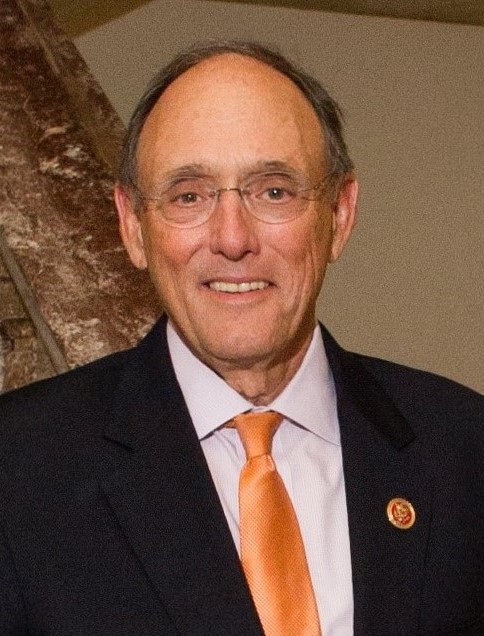
FOR IMMEDIATE RELEASE:
June 12, 2020
CONTACT: press@IAVA.org
IAVA CEO Jeremy Butler and Rep. Phil Roe, M.D. (R-TN) will Answer Questions from Veterans on COVID Challenges, Legislation, Other Priorities
Washington, DC – Iraq and Afghanistan Veterans of America (IAVA) CEO Jeremy Butler will be joined by Rep. Phil Roe, M.D. (R-TN) for a Facebook Live video conference on Wednesday, June 17th. During the video conference, Dr. Roe and Butler will address support for changing the VA motto, highlight important legislation in Congress, and discuss IAVA’s big 6 priorities during COVID-19 and initiatives such as the organization’s Quick Reaction Force (QRF).
To RSVP, please email IAVAmedia@ROKKsolutions.com.
Featuring:
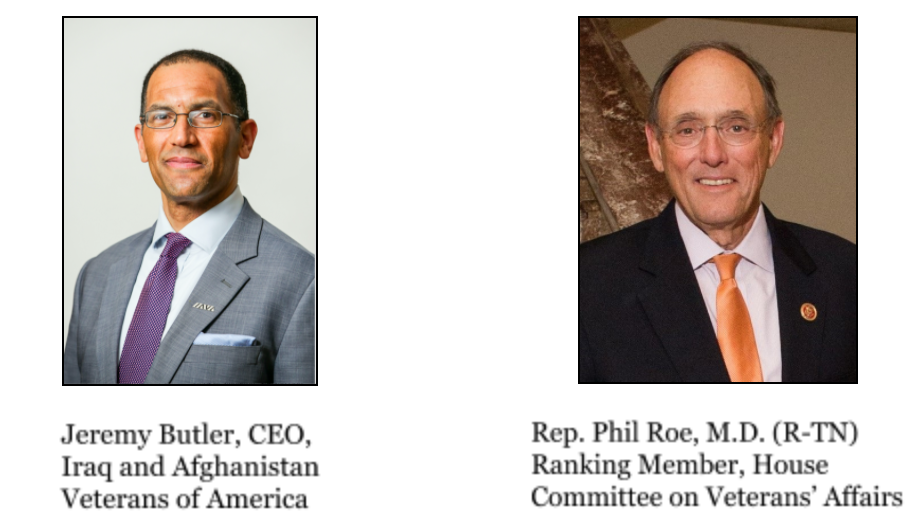
WHO: Rep. Phil Roe, M.D. (R-TN), Ranking Member, House Committee on Veterans’ Affairs, Jeremy Butler, CEO, Iraq and Afghanistan Veterans of America (IAVA)
WHAT: Facebook Live Event
WHEN: June 17th, 2020 at 4:30 PM EST
WHERE: Click here for the link for the Facebook Live event
Jeremy Butler serves as IAVA’s Chief Executive Officer. Jeremy joined IAVA with 15+ years of experience providing substantive and strategic counsel to leaders in high-profile government and private sector offices, to include the Departments of Defense and Homeland Security. He is a graduate of Knox College and the U.S. Naval War College where he received a Master of Arts in National Security and Strategic Studies. He is a Surface Warfare Officer in the Navy Reserve. Butler regularly contributes to Fox News, MSNBC, CNN, C-SPAN, and other mainstream and military media outlets. Butler is also a Commander in the Navy Reserves with nearly 20 years of uniformed service.
Founded by an Iraq veteran in 2004, IAVA is the non-partisan leader in advocacy, public awareness and 1-on-1 care management and peer support. We organize locally, drive historic impacts nationally and fight for over 400,000 veterans and their allies nationwide. If a veteran or their family is in need of assistance now, please reach out to IAVA’s Quick Reaction Force at quickreactionforce.org or 1-855-91RAPID (855-917-2743) to be connected promptly with a veteran care manager who will assist you.
###
#TheJimmyDoreShow Biden Still Telling People To Vote For a Trump!
Iraq and Afghanistan Veterans of America Urges Administration to Release Presidents’ Roadmap Addressing Veteran Suicides
Iraq and Afghanistan Veterans of America Urges Administration to Release Presidents’ Roadmap Addressing Veteran Suicides
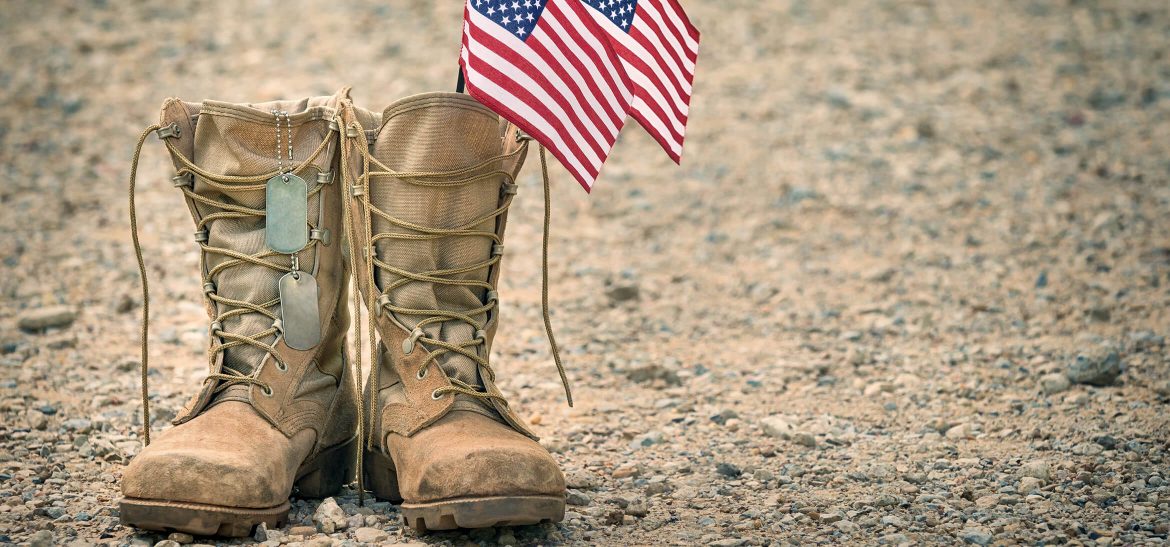
Pandemic Induced Spike in Mental Health Needs Underscores Importance of Government Action to Include Passage of the John Scott Hannon Act
FOR IMMEDIATE RELEASE:
June 5, 2020
CONTACT: press@IAVA.org
New York, NY – Fifteen months after the creation of the Administration’s PREVENTS Task Force, Iraq and Afghanistan Veterans of America (IAVA) is eager to review President Trump’s roadmap on preventing veteran suicide that was reportedly delayed due to the pandemic.
On March 5, 2019, President Trump signed Executive Order 13861 creating an interagency task force to lead the development and implementation of a national, comprehensive roadmap to change how our nation treats mental health and understands suicide prevention. Per EO 13861, the Task Force had a self-imposed deadline of March 5, 2020 to complete the following:
- Develop and submit to the President the roadmap to empower veterans to pursue an improved quality of life, prevent suicide, prioritize related research activities, and strengthen collaboration across the public and private sectors. The roadmap shall analyze opportunities to better harmonize existing efforts within Federal, State, local, territorial, and tribal governments, and non-governmental entities.
- Submit a legislative proposal to the President through the Director of the Office of Management and Budget that establishes a program for making grants to local communities to enable them to increase their capacity to collaborate with each other to integrate service delivery to veterans and to coordinate resources for veterans.
- Develop a national research strategy to improve the coordination, monitoring, benchmarking, and execution of public- and private-sector research related to the factors that contribute to veteran suicide.
During testimony before the House Appropriations VA subcommittee last week, Secretary of Veterans Affairs Robert Wilkie announced that the roadmap would be released on June 14th and would also include plans to combat veteran homelessness and addiction. However, that date no longer appears to be accurate and little clarity has been provided on the actual release date or plans.
“The tragedy of veteran and military suicide is a problem that is not getting better despite years of attention,” said Jeremy Butler, CEO of Iraq and Afghanistan Veterans of America. “In fact, it is likely that the ongoing and pervasive effects of the coronavirus pandemic are only exacerbating an already tragic situation. We are seeing an exponential increase in the stressors that can lead to the onset and worsening of mental health conditions such as job loss, homelessness and compounding medical conditions. While it is easy to use the pandemic as an excuse to delay action, the reality is that our veterans – and the country as a whole – need increased access to and support from mental health care professionals now more than ever.”
The pandemic has spiked veteran unemployment. On top of the existing economic and social pressures veterans face, COVID-19 can mean disaster if more resources are not made available to veterans. We urge the Administration to push forward on their work to assist veterans in need, especially in this time of crisis.
While the veteran community waits for the Administration to release its overdue roadmap, IAVA has taken action to assist veterans immediately. In April, IAVA launched its Quick Reaction Force consolidated-care program. The program is geared towards providing veterans with free, anonymous, and timely assistance with a focus on easy access to care and long-term solutions so meaningful change is made.
IAVA also urges congress to pass the Commander John Scott Hannon Veterans Mental Health Care Improvement Act which includes a vital provision to find and treat at-risk veterans who do not use the VA, ensuring that every veteran has access to quality resources and care. Passage of this bill would mean more could be done for veterans in addressing mental health needs.
Founded by an Iraq veteran in 2004, IAVA is the non-partisan leader inadvocacy,public awareness and1-on-1 care management and peer support. We organizelocally, drive historic impacts nationally and fight for over 400,000 veterans and their allies nationwide. If a veteran or their family is in need of assistance now, please reach out to IAVA’s Quick Reaction Force at quickreactionforce.org or 1-855-91RAPID (855-917-2743) to be connected promptly with a veteran care manager who will assist you.
###
family farmers and farm workers face the virus (David Bacon)
| |||
STUDENTS MARCH TO PROTEST THE POLICE MURDER OF GEORGE FLOYD
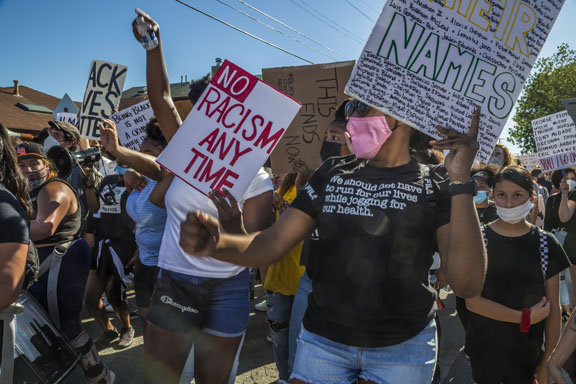
BERKELEY, CA - 09JUNE20 - Hundreds of students, teachers and outraged people march through the streets of Berkeley to protest the police murder of George Floyd in Minneapolis, and other African Americian and other people of color killed by police.
To see a full set of photos, click here: https://www.flickr.com/photos/56646659@N05/albums/72157714656895057
HUGE CAR CARAVAN PROTESTS THE POLICE MURDER OF GEORGE FLOYD
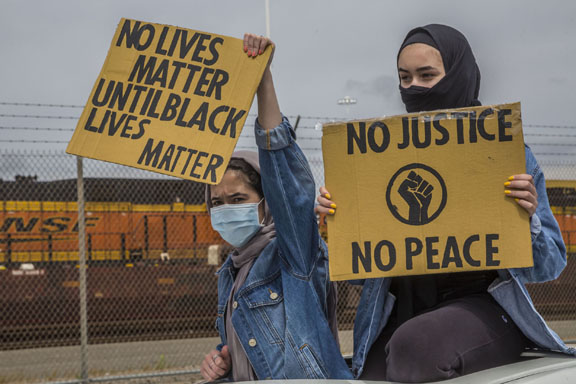
OAKLAND, CA - 31MAY20 - Thousands of people participate in a caravan of over 2000 cars from the Port of Oakland, to protest the police murder of George Floyd in Minneapolis, and African American and people of color killed by police.
To see a full set of photos, click here: https://www.flickr.com/photos/56646659@N05/albums/72157714533842187
IN THE FIELDS OF THE NORTH
Online Exhibit, May 29 to August 2, 2020
Los Altos History Museum
https://www.losaltoshistory.org/exhibits/in-the-fields-of-the-north/

TARTINE HARDSHIP FUND
Newly organized Tartine Bakery workers in the Bay Area need your help and assistance! This fund, supported by the International Longhsore and Warehouse Union, will help hose workers unable to collect unemployment insurance.
The exhibitions in the following list were scheduled before the current COVID-19 crisis. Public gatherings are not now taking place and these exhibitions have now been postponed or rescheduled.
Stay healthy!
DOCUMENTING RESISTANCE -
Community Organizing Beyond the Farmworkers' Movement
Photographs by David Bacon
February 18 - March 27
Powell Library Rotunda, UCLA
Los Angeles, CA
IN WASHINGTON’S FIELDS: Photographs by David Bacon
February 1-May 10, 2020
Washington State History Museum
1911 Pacific Ave., Tacoma, WA
IN THE FIELDS OF THE NORTH / EN LOS CAMPOS DEL NORTE
March 15, 2020 - June 21, 2020
Los Altos History Museum, Los Altos
March 21, 2021 - May 23, 2021
Carnegie Arts Center, Turlock
MORE THAN A WALL - THE SOCIAL MOVEMENTS OF THE BORDER
August 29,, 2020 - November 29,, 2020
San Francisco Public Library
DEPORTATIONS
April 10, 2020 - May 1, 2020
Uri-Eichen Gallery, Chicago
In the Fields of the North / En los Campos del Norte
Photographs and text by David Bacon
University of California Press / Colegio de la Frontera Norte
302 photographs, 450pp, 9”x9”
paperback, $34.95 (in the U.S.)
order the book on the UC Press website:
ucpress.edu/9780520296077
use source code 16M4197 at checkout, receive a 30% discount
En Mexico se puede pedir el libro en el sitio de COLEF:
https://www.colef.mx
Los Angeles Times reviews In the Fields of the North / En los Campos del Norte - click here
"The Criminalization of Migration: A Socialist Perspective" with David Bacon and Rafael Pizarro.
http://ouleft.org/wp-content/uploads/David-Bacon-The-Criminalization-of-migration.mp4
A video about the Social Justice Photography of David Bacon:
https://drive.google.com/file/d/14TvAj5nS08ENzWhw3Oxra4LMNKJCLF4z/view
En los campos del Norte documenta la vida de trabajadores agrícolas en Estados Unidos -
Entrevista con el Instituto Nacional de la Antropologia y Historia
http://www.inah.gob.mx/es/boletines/6863-en-los-campos-del-norte-documenta-la-vida-de-trabajadores-agricolas-en-estados-unidos
Entrevista en la television de UNAM
https://www.youtube.com/watch?v=xdSaBKZ_k0o
David Bacon comparte su mirada del trabajo agrícola de migrantes mexicanos en el Museo Archivo de la Fotografia
http://www.cultura.cdmx.gob.mx/comunicacion/nota/0038-18
Trabajo agrícola, migración y resistencia cultural: el mosaico de los “Campos del Norte”
Entrevista de David Bacon por Iván Gutiérrez / A los 4 Vientos
http://www.4vientos.net/2017/10/04/trabajo-agricola-migracion-y-resistencia-cultural-el-mosaico-de-los-campos-del-norte/
"Los fotógrafos tomamos partido"
Entrevista por Melina Balcázar Moreno - Milenio.com Laberinto
http://www.milenio.com/cultura/laberinto/david_baconm-fotografia-melina_balcazar-laberinto-milenio_0_959904035.html
Die Apfel-Pflücker aus dem Yakima-Tal
http://www.nrhz.de/flyer/beitrag.php?id=23990
http://us7.campaign-archive2.com/?u=fc67a76dbb9c31aaee896aff7&id=0644c65ae5&e=dde0321ee7
Entrevista sobre la exhibicion con Alfonso Caraveo (Español)
https://www.youtube.com/watch?v=lJeE1NO4c_M&feature=youtu.be
THE REALITY CHECK - David Bacon blog
http://davidbaconrealitycheck.blogspot.com
Books by David Bacon
The Right to Stay Home: How US Policy Drives Mexican Migration (Beacon Press, 2013)
http://www.beacon.org/productdetails.cfm?PC=2328
Illegal People -- How Globalization Creates Migration and Criminalizes Immigrants (Beacon Press, 2008)
Recipient: C.L.R. James Award, best book of 2007-2008
http://www.beacon.org/Illegal-People-P780.aspx
Communities Without Borders (Cornell University/ILR Press, 2006)
http://www.cornellpress.cornell.edu/book/?GCOI=80140100558350
The Children of NAFTA, Labor Wars on the U.S./Mexico Border (University of California, 2004)
http://www.ucpress.edu/book.php?isbn=9780520244726
En Español:
EL DERECHO A QUEDARSE EN CASA (Critica - Planeta de Libros)
http://www.planetadelibros.com.mx/el-derecho-a-quedarse-en-casa-libro-205607.html
HIJOS DE LIBRE COMERCIA (El Viejo Topo)
http://www.tienda.elviejotopo.com/prestashop/capitalismo/1080-hijos-del-libre-comercio-deslocalizaciones-y-precariedad-9788496356368.html?search_query=david+bacon&results=1
For more articles and images, see http://dbacon.igc.org and http://davidbaconrealitycheck.blogspot.com
and https://www.flickr.com/photos/56646659@N05/albums

